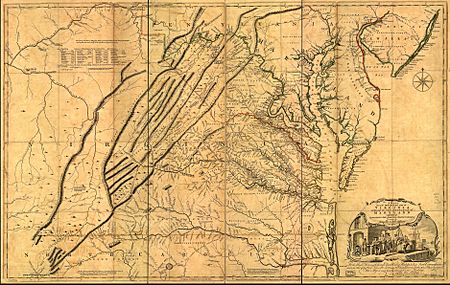Carpenter Creek facts for kids
Carpenter Creek is a historical name for what we now call Potts Creek in western Virginia. This creek appeared on maps as early as 1751. Famous figures like Thomas Jefferson also mentioned it by this name in his writings from the 1780s. Other old maps from the 1770s also showed it as Carpenter Creek.
Potts Creek: A River with Two Names
Potts Creek got its current name from a settler named Potts. This person lived further up the valley, near where the creek starts on Potts Mountain. The name Carpenter Creek was still used sometimes even in 1784. However, by the late 1790s, most people called it Potts Creek.
Who Was Joseph Carpenter?
Carpenter Creek was named after Joseph Carpenter. On June 1, 1750, he received official permission from the British government. This permission, called a patent, allowed him to own 782 acres (about 3.16 square kilometers) of land. This land was located where the creek flows into the Jackson River.
Where is Potts Creek Today?
Today, Potts Creek is about 46 miles (74 kilometers) long. It is a smaller stream that flows into the Jackson River in western Virginia. The Jackson River then flows into the James River. All these waters eventually reach the Chesapeake Bay.
Potts Creek begins in Monroe County, West Virginia, near Waiteville. It then flows northeast through Craig County and Alleghany County in Virginia. Finally, it joins the Jackson River near the town of Covington.
 | John T. Biggers |
 | Thomas Blackshear |
 | Mark Bradford |
 | Beverly Buchanan |


